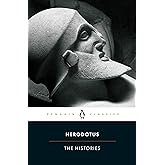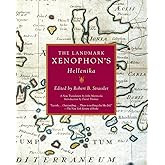
Download the free Kindle app and start reading Kindle books instantly on your smartphone, tablet, or computer - no Kindle device required.
Read instantly on your browser with Kindle for Web.
Using your mobile phone camera - scan the code below and download the Kindle app.



 Audible sample
Audible sample The Persian Expedition Audio CD – Unabridged, May 8, 2020
Purchase options and add-ons
MP3 CD Format
In The Persian Expedition (also known as The March of the Ten Thousand and Anabasis), Xenophon, a disciple of Socrates, relates his experiences of fighting with the Greek mercenary army The Ten Thousand' in Persia, and how he led them back to the safety of the Black Sea coast. Seeking to depose his brother Artaxerxes and take his place upon the Persian throne, Cyrus the Younger leads the 10,000 mercenaries on a dangerous campaign deep into the heart of Persia. There Cyrus is killed and his generals overthrown, leaving a young Xenophon to lead the army on its treacherous journey home. Snowy mountains, wide rivers, violent blizzards and hostile tribes obstruct their way, testing Xenophon's leadership and his soldiers' perseverance to the extreme.- Print length1 pages
- LanguageEnglish
- PublisherNaxos and Blackstone Publishing
- Publication dateMay 8, 2020
- Dimensions5.3 x 0.6 x 6.7 inches
- ISBN-101094166316
- ISBN-13978-1094166315
Book recommendations, author interviews, editors' picks, and more. Read it now
Customers who viewed this item also viewed
Editorial Reviews
About the Author
Xenophon (c. 431-355 BC) served for some years as a mercenary in the Middle East and Asia Minor and later wrote pioneering works on history, politics, and philosophy, as well as a number of technical treatises.
Product details
- Publisher : Naxos and Blackstone Publishing; Unabridged edition (May 8, 2020)
- Language : English
- Audio CD : 1 pages
- ISBN-10 : 1094166316
- ISBN-13 : 978-1094166315
- Item Weight : 2.89 ounces
- Dimensions : 5.3 x 0.6 x 6.7 inches
- Best Sellers Rank: #5,313,663 in Books (See Top 100 in Books)
- #95 in Ancient Greek History (Books)
- #1,070 in History of Civilization & Culture
- #13,314 in Middle East History
- Customer Reviews:
About the author

Xenophon (/ˈzɛnəfən, -ˌfɒn/; Greek: Ξενοφῶν [ksenopʰɔ̂ːn], Xenophōn; c. 430 – 354 BC), son of Gryllus, of the deme Erchia of Athens, also known as Xenophon of Athens, was a Greek historian, soldier, mercenary, and student of Socrates. While not referred to as a philosopher by his contemporaries, his status as such is now a topic of debate. He is known for writing about the history of his own times, the late 5th and early 4th centuries BC, especially for his account of the final years of the Peloponnesian War. His Hellenica, which recounts these times, is considered to be the continuation of Thucydides’ History of the Peloponnesian War. His youthful participation in the failed campaign of Cyrus the Younger to claim the Persian throne inspired him to write his most famous work, Anabasis.
Despite growing up in Athens and being an Athenian citizen, Xenophon is also associated with Sparta, the traditional enemy of Athens. His pro-oligarchic views, service under Spartan generals in the Persian campaign and beyond, as well as his friendship with King Agesilaus II endeared Xenophon to the Spartans, and them to him. A number of his writings display his pro-Spartan bias and admiration, especially Agesilaus and Constitution of Sparta. Other than Plato, Xenophon is the foremost authority on Socrates, having learned under the great philosopher while a young man. He greatly admired his teacher, and well after Socrates’ death in 399 Xenophon wrote several Socratic dialogues, including an Apology concerning the events of his trial and death. Xenophon’s works cover a wide range of genres and are written in very uncomplicated Attic Greek. Xenophon’s works are among the first that many students of Ancient Greek translate on account of the straightforward and succinct nature of his prose. This sentiment was apparent even in ancient times, as Diogenes Laertius states in his Lives of Eminent Philosophers (2.6) that Xenophon was sometimes known as the "Attic Muse" for the sweetness of his diction.
Bio from Wikipedia, the free encyclopedia. Photo by Scan by User:Gabor [Public domain], via Wikimedia Commons.
Customer reviews
Customer Reviews, including Product Star Ratings help customers to learn more about the product and decide whether it is the right product for them.
To calculate the overall star rating and percentage breakdown by star, we don’t use a simple average. Instead, our system considers things like how recent a review is and if the reviewer bought the item on Amazon. It also analyzed reviews to verify trustworthiness.
Learn more how customers reviews work on AmazonCustomers say
Customers find the book's narrative fascinating, describing it as a classic true adventure that explores human nature. Moreover, the book receives positive feedback for its readability and moral content, with one customer highlighting the Greek spirit of brotherhood among men under pressure. However, the translation quality receives mixed reviews, with some finding it well done while others note that Xenophon is not a particularly good writer.
AI-generated from the text of customer reviews
Select to learn more
Customers find the book's story engaging, describing it as a classic adventure that explores human nature, with one customer noting it as a significant narrative of West meets East.
"...It describes daily life, military strategies and the different cultures encountered along the way...." Read more
"...His is a story of survival, and the style complements the story...." Read more
"...being truthful or rigorous, but the book, nevertheless is interesting to read through to get a first hand account of mercenary life in 400 BC as..." Read more
"...This is truly a classic adventure, and can be made into any number of novels or movies, set in nearly any time frame, and has been the source..." Read more
Customers find the book readable and engaging, describing it as a classic that is really interesting to read.
"...It's a good read even if you aren't a military buff." Read more
"...primary source material is limited, making books like this worth while...." Read more
"Really interesting read, seller was good, shipped fast" Read more
"...The book is rather dry and matter-of-fact, but held my interest." Read more
Customers appreciate the book's approach to morale, with one review highlighting the Greek spirit of brotherhood under pressure, while another notes its informative discussions about military strategies.
"...It describes daily life, military strategies and the different cultures encountered along the way...." Read more
"...more a tale of human nature, treachery, intrigue, loyalty, logistics, morale, and determination...." Read more
"...But that is typical for his era. Dynamic, philosophical and descriptive, I found the book to be a really good read." Read more
"...Highly recommend for military and history lovers." Read more
Customers have mixed opinions about the translation of the book, with some finding it well done and easy to read, while others note that Xenophon is not a particularly good writer.
"...The direct and uncomplicated style of "The March Up Country" is no doubt part of the reason why, as George Cawkwell of University College..." Read more
"...My only problem with this book is the grammar, however; it's not of poor quality...." Read more
"...The translation is very easy to read and the lengthy introduction spells out the shortcomings of the book: there are several other accounts of the..." Read more
"...This book is easily accessible to those without a military background, as it is not a tale of tactics, but more a tale of human nature, treachery,..." Read more
Top reviews from the United States
There was a problem filtering reviews. Please reload the page.
- Reviewed in the United States on April 18, 2025This detailed record of Xenophon's military travels was far more interesting than I expected. It describes daily life, military strategies and the different cultures encountered along the way. It's a good read even if you aren't a military buff.
- Reviewed in the United States on February 23, 2015Persons reading Xenophon’s "The Persian Expedition" for epic battle action will get epic battle action. But there is much, much more for the careful reader in Xenophon’s account of how he led ten thousand mercenaries across Asia Minor and back to their Greek home.
First, a word about the title. Many readers, particularly those who are familiar with classical history and culture, will probably know this book as the Anabasis. Okay, so the Iliad is the story of the war at Ilium (or Troy), while the Odyssey is the story of Odysseus’ long voyage home from that war; now, what the heck is an Anabasis? The term translates roughly as “The March Up Country,” and I have seen the book published under that title; but as a title, "The Persian Expedition" is nothing if not accurate.
And a hell of an expedition it was. In 401 B.C., Xenophon, a young nobleman of Athens, was among the leaders of 10,000 mercenaries who were, perhaps not too wisely, allowing themselves to become incorporated into the power politics of the Persian Empire. The mercenaries’ employer, Cyrus the Younger, sought to depose his brother, the emperor Artaxerxes, and take Artaxerxes' place upon the Persian throne. But Cyrus’ plans went permanently and irrevocably awry at the battle of Cunaxa: the good news – his army won the battle; the bad news – Cyrus himself was killed. The 29-year-old Xenophon was left among the leaders of an army of mercenaries, with hundreds of miles of hostile territory to cross before they could get home to Greece. After dealing with the treachery of the Persian leader Tissaphernes, Xenophon persuaded his fellow Greeks that they could make the march – “Whoever wants to see his own people again must remember to be a brave soldier: that is the only way of doing it. Whoever wants to keep alive must aim at victory” (p. 156) – and their long march to the sea began.
Their march involved arduous treks through bitterly cold mountain passes – “Soldiers who had lost the use of their eyes through snow-blindness or whose toes had dropped off from frostbite were left behind” (p. 197) – as well as battles with a great many tribal nations of Asia Minor (modern Turkey), all of whose customs, weapons, and battle tactics Xenophon describes in detail.
Xenophon writes in a direct, no-nonsense, soldierly style. Readers who savor the playful dialogues of Plato, or the intellectual intricacy of Aristotle’s orderly setting-forth of philosophical concepts, will find that Xenophon has no time for any of that sort of thing. His is a story of survival, and the style complements the story. The tone and style of the Anabasis reminded me of Julius Caesar’s Commentaries; reading of the Ten Thousand and the March to the Sea was, for me, much like reading about the conquest of Gaul, or the civil war with Pompey – bracingly uncomplicated. And, like Caesar, Xenophon knew that writing about oneself in the third person can make it seem quite objective when one is talking about one’s own good ideas and well-thought-out actions.
The direct and uncomplicated style of "The March Up Country" is no doubt part of the reason why, as George Cawkwell of University College Oxford points out in a helpful foreword, it was a staple of the classical education of many and many an English schoolboy. In classrooms from Exeter to London to Newcastle-upon-Tyne, young lads looked ahead to translating this sentence: “So Xenophon mounted his horse and, taking Lycus and the cavalry with him, rode forward to give support, and, quite soon, they heard the soldiers shouting out ‘The sea! The sea!’ and passing the word down the column” (p. 211). Θαλάσσα! Θαλάσσα! Thalassa! Thalassa! The sea! The sea! One would think that that dramatic moment would be the end of the story.
It wasn’t, of course. When “The Greeks Catch Sight of the Sea” (the title of that chapter), there are still 140 pages of "The Persian Expedition" to go. Xenophon and his men are in Greek territory at that point, to be sure – among Greek-speaking people who share their language and culture. But they are 10,000 mercenaries, soldiers who fight for money – men who want something to eat and drink, and are no doubt also interested in finding, shall we say, companionship. Is it any wonder if the people of Black Sea city-states like Trapezus and Sinope are largely eager to send the Greeks on their way?
The modern applicability of the Anabasis is considerable. For example, as many students of the American Civil War know, Union General William T. Sherman was an avid reader of classical literature. It is intriguing to wonder if Sherman’s own 1864 march across hostile Confederate territory – 250 miles, from Atlanta to the sea – may have been inspired by a reading of Xenophon. And if you’ve seen Walter Hill’s cult-film classic "The Warriors" (1979), with its New York City street gang having to fight its way through hostile territory, past a variety of rival gangs (each with its own wildly stylized uniforms and weapons), in a long struggle to get back safely to their Coney Island turf, then you’ve seen a film whose original inspiration, "The March Up Country," was written 2400 years ago.
With a helpful map that enables one to follow the entire long journey of Xenophon and his Ten Thousand, this Penguin Books edition of "The Persian Expedition" is a great addition for the libraries of classicists and armchair adventurers alike.
- Reviewed in the United States on August 14, 2009I guess I enjoyed reading Xenophon's "The Persian Expedition" or "Anabasis". The book and Xenophon has been denigrated through the millennia for not being truthful or rigorous, but the book, nevertheless is interesting to read through to get a first hand account of mercenary life in 400 BC as well as a hint of life in Persian lands. On the other hand, the book has been read throughout the ages by school children and those learning Greek.
The translation is very easy to read and the lengthy introduction spells out the shortcomings of the book: there are several other accounts of the Ten Thousand that do not offer the same account of events as Xenophon's.
Regardless, if you are interested in antiquity, primary source material is limited, making books like this worth while. I'd also consider Robin Waterfield's translation which has much more extensive footnotes
- Reviewed in the United States on July 19, 2024Really interesting read, seller was good, shipped fast
- Reviewed in the United States on November 14, 2014"Xenophon" is a family name (given to my grandfather, born in Michigan around 1850) and I bought this book to find out who he was. I only knew from books that Xenophon was a Greek general whose name meant "fear of strangers". This book by the original named Xenophon describes his retreat back to Greece through Asia Minor around 400 BC. The book is rather dry and matter-of-fact, but held my interest.
- Reviewed in the United States on June 13, 2019Anabasis – aka The Ten Thousand – aka The Persian Expedition
by Xenophon
When a book is over two thousand years old and still in print, it tends to gather more than one name.
Xenophon was one of the leaders of this roughly 10,000 man Greek expedition into Persia, and tells his tale in the third person. This is truly a classic adventure, and can be made into any number of novels or movies, set in nearly any time frame, and has been the source catalyst of many such stories. This book is easily accessible to those without a military background, as it is not a tale of tactics, but more a tale of human nature, treachery, intrigue, loyalty, logistics, morale, and determination. For those not versed in military history, Anabasis will provide some good perspective in the cold realities of military forces operating in a foreign land, versus the politically correct fantasies one so often sees in the media.
I heartily recommend Xenophon’s Anabasis for all readers. Be advised it does slow down quite a bit in the final several chapters, of 51 total.
- Reviewed in the United States on January 12, 2025Only a few years after cyrus the greats death would be more interesting if xeno and cyrus the great met
- Reviewed in the United States on September 11, 2022A truly fascinating story about a great Greek commander by the name of Xenophon who was born in Athens and fought for the SPARTAN. A mercenary by trade and how he got stranded inside Persia and had to fight his way back into Greece. Remarkable book and a remarkable man. Good reading!!
Top reviews from other countries
 The modern spartanReviewed in Sweden on August 7, 2024
The modern spartanReviewed in Sweden on August 7, 20245.0 out of 5 stars The persian expedition
Great story !!
 Amazon CustomerReviewed in Canada on December 8, 2024
Amazon CustomerReviewed in Canada on December 8, 20245.0 out of 5 stars The best gift ever!
My son is extremely happy with this book. Big thanks to Amazon and the seller.
 harperReviewed in the United Kingdom on September 21, 2020
harperReviewed in the United Kingdom on September 21, 20205.0 out of 5 stars Classic of classics!
This story was a classic even in the classical era itself. This kindle edition is a perfectly adequate formatting. A must read for any student of history and storytelling
 AnneReviewed in Australia on May 23, 2024
AnneReviewed in Australia on May 23, 20245.0 out of 5 stars Great book
Am still working my way through this book but enjoying it as author has made this historical book readable.
-
 Gjorgji EfremovReviewed in Germany on January 31, 2024
Gjorgji EfremovReviewed in Germany on January 31, 20245.0 out of 5 stars Wie beschrieben
Product wie beschrieben. Mega Farbe, gutes Qualität.













